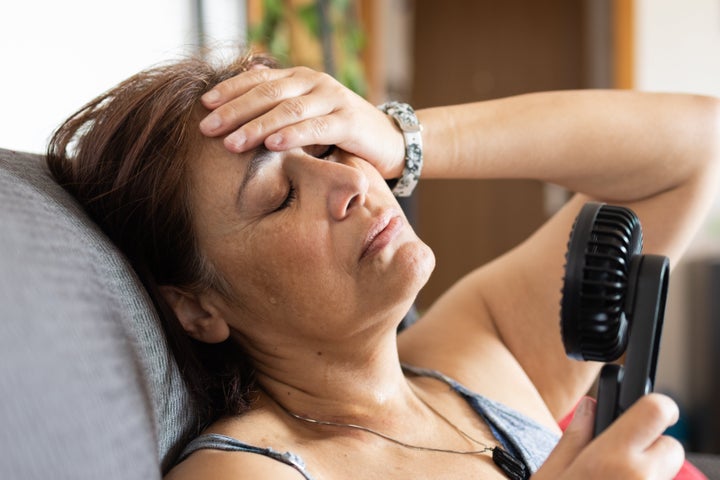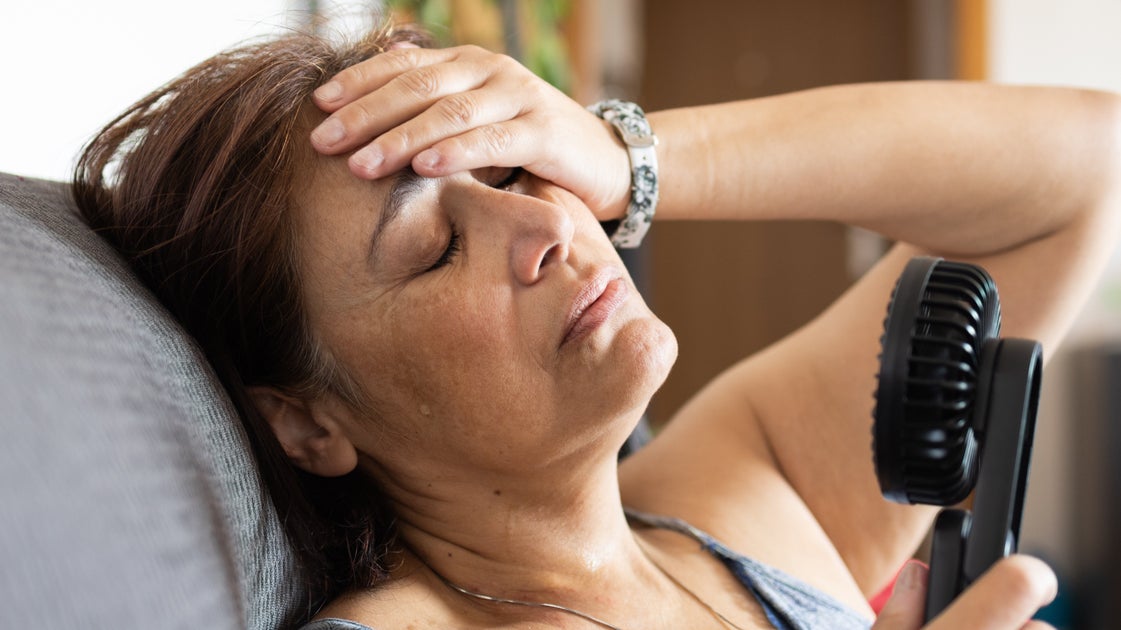When it’s gorgeously sunny outside, it can feel wrong to feel so miserable on the inside.
But your summer slump might not just be in your head –– it could be due to a real health phenomenon that could require getting help.
That’s because higher temperatures and humidity can trigger, even exacerbate, depression and recurring health problems in unseen ways. The first step is recognizing how this time of year could be the cause of your cranky and gloomy moods and sleepless nights.
Here’s what you need to watch out for.
Your summer slump might be an understudied — but very real — type of seasonal depression.

David Petrus Ibars via Getty Images
If being outside in the heat puts you on edge and miserable, you might have summer SAD.
You may know about seasonal affective disorder (SAD) causing recurring depression in the fall and winter. Still, not enough people know that hot, humid summers are also a trigger for SAD, because this kind of seasonal depression is “tremendously understudied,” said Kelly Rohan, a psychology professor at the University of Vermont. “The existing studies are from the late 1980s, early 1990s and with very small sample sizes.”
It’s also hard for people to realize their depression is specifically due to the weather.
“There’s people with winter depression that are affected for years before they put it together,” Rohan said. “The same phenomenon applies to those who are out there suffering with summer depression, and haven’t yet put it together that this is a pattern.”
You might also be confused because people with winter SAD experience their depression differently than people in the hotter months.
People who experience this in the colder months report feeling lethargic, craving more rich carbohydrates, and sleeping too much. But if you experience this in the summer, you might be more likely to experience insomnia and a lowered appetite, Rohan said.
Unlike the lethargy of winter SAD, summer SAD could also make you agitated. To be clear, summer SAD is not just disliking a hot, humid day and preferring winter. Instead, going outside under this heat-related depression can spark overwhelming, averse feelings of “I can’t take this. I can’t function in this kind of humidity. I need to get into the embrace of a dark movie theater right now in order to feel human,” Rohan said.
Tanisha Ranger, a Nevada-based clinical psychologist who practices in a state with extreme heat, said she regularly has clients who say they get depressed in the summer.
“When the weather becomes oppressively hot, we naturally tend to withdraw indoors, and that means less movement, ironically less sunlight, and disrupted social interactions,” Ranger said. “All of that can exacerbate anxiety and depression symptoms if they were already present, and cause some if they weren’t.“
Ranger noted that extreme heat can impact serotonin production, often leading to increased irritability and decreased sleep quality, which in turn, can exacerbate underlying psychiatric conditions, because poor sleep is a strong predictor of depressive symptoms.
How To Help Fix Your Summer Slump
If you believe the rising temperatures are making you miserable, you don’t have to wait till winter to get relief from your symptoms. There are proven strategies for addressing heat-related summer slumps:
Prioritize sleep.
“Use fans, cooling mattress pads, or lighter bedding. Poor sleep compounds heat sensitivity, especially during hormonal fluctuations,” said Dr. Marjorie Jenkins, vice president of health affairs at the University of North Dakota and chief clinical officer at Incora Health, a health technology company.
Cool yourself down.
If you have summer SAD, your clinician might also recommend thermo-regulatory interventions to cool you down, such as recommending you stay in air conditioning, or possibly taking timed cold baths or showers, Rohan explained.
“What seems to bring at least immediate relief is cooling the person down at the core,” Rohan said.
Drink more water.
Ranger said dehydration can mimic anxiety and depressive symptoms like dizziness, fatigue, restlessness, so staying hydrated can help support both physical and emotional regulation.
Find time to move.
You might want to hole up indoors when it’s so hot outside, but a walk or run in the early morning or late evening can help.
“Even 10 minutes of intentional movement early in the day before the heat peaks can lift mood and help regulate circadian rhythms,” Ranger suggested.
Stop comparing other people’s ideal summer to yours.
20 Years OfFreeJournalism
Your Support Fuels Our Mission
Your Support Fuels Our Mission
For two decades, HuffPost has been fearless, unflinching, and relentless in pursuit of the truth. Support our mission to keep us around for the next 20 — we can’t do this without you.
We remain committed to providing you with the unflinching, fact-based journalism everyone deserves.
Thank you again for your support along the way. We’re truly grateful for readers like you! Your initial support helped get us here and bolstered our newsroom, which kept us strong during uncertain times. Now as we continue, we need your help more than ever. .
We remain committed to providing you with the unflinching, fact-based journalism everyone deserves.
Thank you again for your support along the way. We’re truly grateful for readers like you! Your initial support helped get us here and bolstered our newsroom, which kept us strong during uncertain times. Now as we continue, we need your help more than ever. .
Already contributed? Log in to hide these messages.
Summer gets romanticized as a carefree time of year filled with beach days and vacation, which can make people with depression and anxiety during this season feel even worse.
If you’re not constantly having “summer fun,” you might feel as if you are somehow missing out, said Shannon Garcia, a psychotherapist at States of Wellness Counseling based in Illinois and Wisconsin: “That mindset alone can lead to burnout and a summer slump.”
Get professional help.
If you suspect summer SAD, don’t try to diagnose yourself ―go to a clinician who can give you specialized treatments for your particular needs. “There are good treatments for depression, such as psychotherapy, cognitive behavioral therapy and antidepressant medications” that can address your summer SAD, Rohan said.
When you’re depressed, better days can seem impossible to imagine, but the good news is that this kind of summer slump is treatable, and it’s easier to address the sooner that you take action.
“If it’s seasonal depression, it’s recurrent, meaning it comes back every year,” Rohan said. “So the earlier we can get in there and interrupt that cycle with an effective treatment, the better.”

